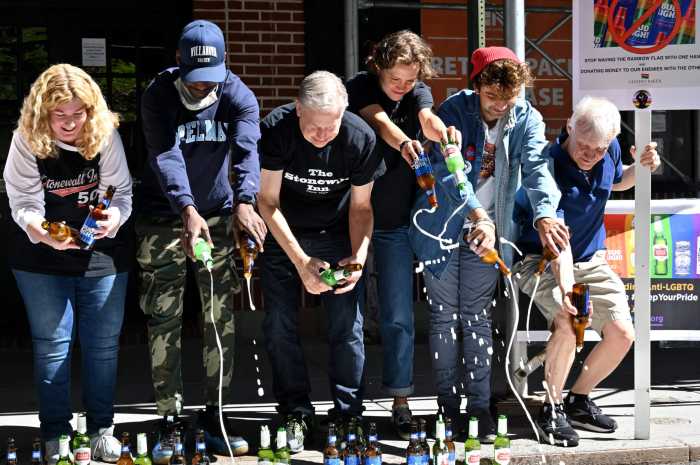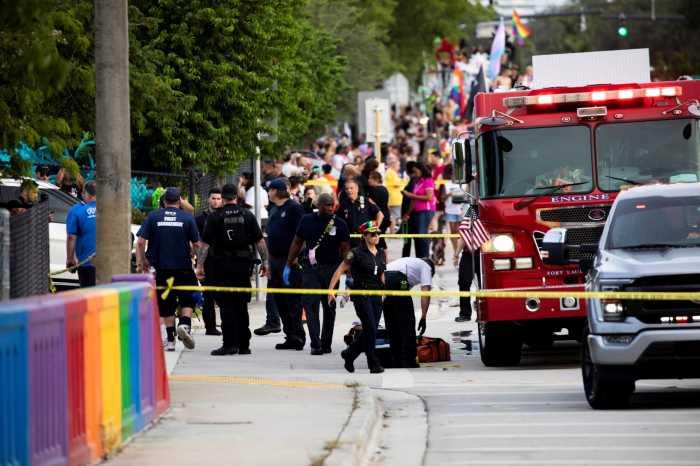On May 17, Florida joined the drag show panic fanned by Republican state lawmakers when Governor Ron DeSantis signed into law Senate Bill 1438, which amends existing laws and creates a new statute that makes it a crime to “knowingly” admit a “child” to an “adult live performance.” Despite the legislature’s careful avoidance of expressly mentioning drag shows in the law, the intent of the legislature was clearly articulated by its sponsors.
In defending the statute against a First Amendment free speech attack by Hamburger Mary (HM), a restaurant that presents live drag shows to its customers, the state argues that the statute “furthers the compelling state interest of protecting children from exposure to ‘age-inappropriate, sexually explicit live performances.’” The state takes the position that the law does not apply to all drag shows, just those that are “inappropriate” for children to attend because of their “lewd” character.
In his June 23 Order issuing a preliminary injunction against enforcement of the statute by the Florida Department of Business and Professional Regulation (DBPR), Senior U.S. District Judge Gregory A. Presnell observes that the legislature has failed to define key words and phrases used in the statute with enough specificity to clearly inform the public what is being prohibited, which is a serious flaw in a criminal statute.
For example, the statute never defines the term “child,” leaving a reader to guess what age range is intended. It uses the term “adult live performance,” which it does define, but uses vague terms such as “lewd conduct” and “lewd exposure of prosthetic or imitation genitals or breasts” which introduces a subjective element, rendering the scope of the statute too indefinite for an ordinary individual to figure out which drag shows come within the statute’s purview.
The scope of the statute was deemed by HM to be uncertain enough that the company decided to bar all minors from being present at the drag shows it is presenting. Although HM believes that its drag shows are generally age appropriate for children and do not present any lewd exhibitions, it is just uncertain enough about how law enforcement officials will interpret these terms that it was “chilled” from presenting the shows.
Backing up its fears was a recent threat by the Secretary of DBPR, Melanie Griffin, the leading named defendant in this lawsuit, to revoke the liquor license of “Orlando’s Plaza Live” in response to that establishment’s presentation in December of “A Drag Queen Christmas Show.” The written threat by Griffin states that she “had reason to believe that the drag show is of a sexual nature involving the sexualization of children’s stories.” Apparently, any innuendo or eye-winking at a drag show could set off an investigation and possible penalties.
HM indicated that announcing to its customers that children would not be admitted to the restaurant when drag shows are taking place had led to many cancellations of reservations and a consequent drop in revenue. Thus, HM’s standing to challenge the new law was very clear. It has a personal economic stake in challenging the constitutionality of the statute.
After dispensing with formalistic and procedural matters raised by the defendants in their motion to dismiss the case, Judge Presnell stated his conclusion that the law is a “facially content-based regulation” of speech, thus subject to strict scrutiny, a level of judicial review that Presnell asserted it would not likely survive. In order to enforce a content-based speech ban, the government has to show that the law is narrowly-tailored to serve compelling state interests. While HM concedes that the state may have a compelling interest in protecting minors from exposure to an obscene show, besides arguing that its drag shows are not obscene it focuses on the “narrow tailoring” requirement, arguing that ambiguities in the statute render it potentially overly broad.
Defendants relied on a 1968 Supreme Court decision, Ginsberg v. New York, upholding a law that restricted the sale of sexually-oriented materials to children. The court pointed out that the statutory ban in Ginsberg was “narrowly tailored,” as it prohibited sales to children while respecting the right of parents to buy materials for their children that the parents deemed appropriate, unlike what Florida has done in this statute, substituting its own judgment for that of the parents. Also, the statute in Ginsberg applied only to commercial transactions, while Florida’s drag ban extends to all “live performances” regardless where they take place and whether admission is charged. Most importantly, the statute uses words that have in other contexts been determined to give too much discretion to law enforcement officers to interpret terms such as “lewd conduct” and “lewd exposure.”
The court also saw an “inevitable clash with Florida’s ‘Parents’ Bill of Rights’ and other laws.” Florida has expressly protected the right of a parent to “direct the upbringing and the moral or religious training of his or her minor child.” Other Florida laws apparently allow for a minor accompanied by their parent to attend the kinds of live performances that are the focus of this new Florida anti-drag law.
“Unlike comparable statutes which target commercial activity and are more narrowly tailored in their scope to allow for parental discretion, specific age thresholds, and clearly defined terms,” wrote the judge, this law “proscribes conduct universally and threatens to permit a standardless sweep which would allow policemen, prosecutors, and juries to pursue their personal predilections.”
The court also found that the “void for vagueness” due process doctrine could apply to this case on top of the free speech issues. Judge Presnell identified “several aspects” of the law “that raise vagueness concerns,” once again referring to the undefined term “lewd,” finding that the various attempts to define lewdness elsewhere in Florida law were “vulnerable to broad subjectivity which ultimately leaves an individual of common intelligence to necessarily guess at their meaning.”
For example, he wrote, “A fully clothed drag queen with cleavage-displaying prosthetic breasts reading an age-appropriate story to children may be adjudged ‘wicked’ — and thus ‘lewd’ — by some, but such a scenario would not constitute the kind of obscene conduct prohibited by the statutes in cases like Miller [v. California],” which is the Supreme Court’s leading precedent on obscenity.
The court found that allowing the law to remain in effect while the litigation proceeds would impose irreparable injury on HM, which is chilled by the prospect of enforcement from presenting its usual drag shows to the usual audiences that include families with children. The state claims that a preliminary injunction would “harm the public by exposing children to ‘adult live performances,’” but the court wrote, “This concern rings hollow, however, when accompanied by the knowledge that Florida state law, presently and independently of the instant statutory scheme, permits any minor to attend an R-rated film at a movie theater if accompanied by a parent or guardian. Such R-rated films routinely convey content at least as objectionable as that covered” by the anti-drag law.
The court found persuasive HM’s record of presenting these shows for fifteen years “incident-free,” and pointed out that other more narrowly-targeted Florida laws already exist to give the state “the necessary authority to protect children from any constitutionally unprotected obscene exhibitions or shows. The harm to the plaintiff clearly outweighs any purported evils not covered by Florida law and a preliminary injunction would not be averse to the public interest,” Judge Presnell concluded.
HM is represented by Brice Moffat Timmons and Melissa J. Stewart of Donati Law PLC, a Memphis-based firm, and local counsel Gary S. Israel of Orlando. Judge Presnell was appointed by President Bill Clinton.


































